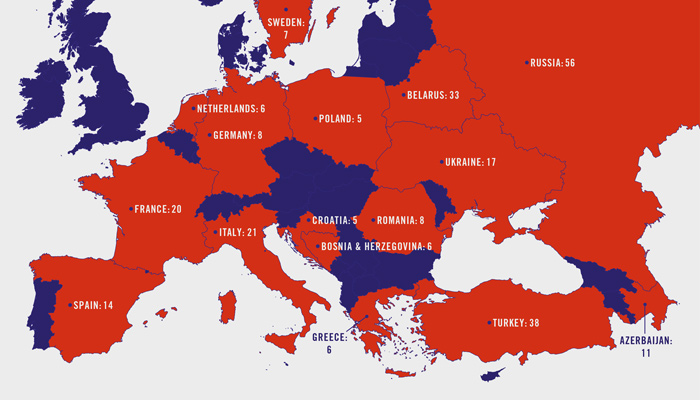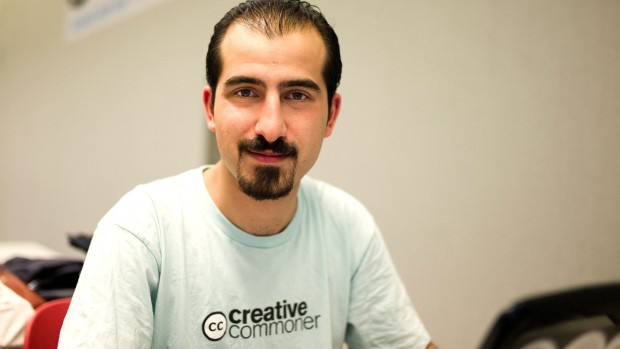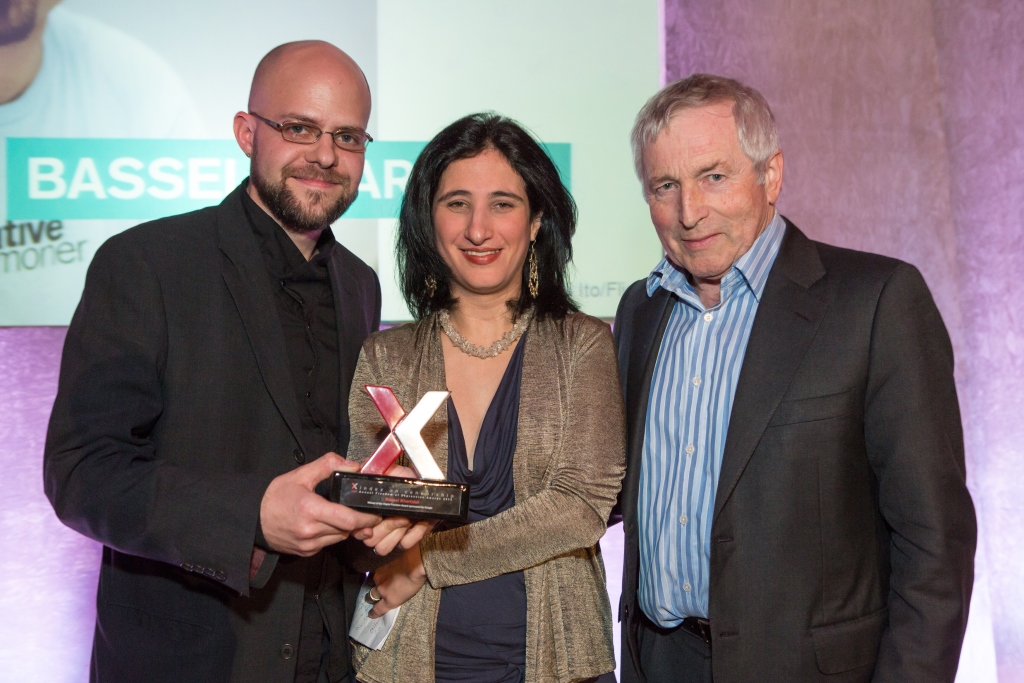2 Aug 2017 | Mapping Media Freedom, Media Freedom, media freedom featured, News and features

Journalists continue to face unprecedented pressure in Europe as reports submitted to Index on Censorship’s Mapping Media Freedom platform in the first quarter of 2017 demonstrate. Media professionals—primarily in Turkey, Russia, Belarus and Ukraine—were arrested at an alarming rate, more than a fourfold increase over the fourth quarter of 2016.
“During the first quarter of 2017, the MMF database registered several trends that we find to be acute challenges to media freedom. Some European governments have clearly interfered with media pluralism. Others have harassed, detained and intimidated journalists. All of these actions debase and devalue the work of the press and undermine a basic foundation of democracy,” Hannah Machlin, project manager at Mapping Media Freedom, said.
During Q1, authorities in multiple countries shut down critical and independent media outlets and intimidated reporters who asked challenging questions. Turkey continues to be the largest jailer of journalists in the world with a total of 148 journalists in prison by the end of March according to the Platform for Independent Journalists P24, a Turkey-based MMF partner, which monitors the number of arrests in the country.
Even reporters in countries often thought to respect freedom of the press, such as Sweden, France and Germany, faced obstacles to performing their professional duties. They were abused by the leaders of extreme populist movements and their supporters, who encouraged a distrust of “mainstream media”; and blocked by nervous politicians who were seeing, particularly in France, the old political certainties swept away.
Between 1 January and 31 March 2017, Mapping Media Freedom’s network of correspondents and other journalists submitted a total of 299 violations of press freedom to the database.
The full report can be found online at Mapping Media Freedom or in PDF format.
2 Aug 2017 | Campaigns, Campaigns -- Featured, Digital Freedom, Digital Freedom Statements, Middle East and North Africa, Statements, Syria
[vc_row][vc_column][vc_column_text]

2013 Freedom of Expression Digital Activism Award-winning Bassel Khartabil.
Index on Censorship mourns the death of 2013 Freedom of Expression Digital Activism Award-winning Bassel Khartabil, who had been held Syrian prisons since 2012. His execution by the Syrian government was announced by his wife, Noura Ghazi Safadi, on Tuesday 1 August 2017.
“Bassel was a true inspiration and hero for us all. Index joins with outraged members of the international community to mourn the death of Bassel, who lived and died for his belief in freedom of speech, transparency and a free internet. We extend our deepest condolences to his family,” Melody Patry, head of advocacy, Index on Censorship said.
A Syrian-born Palestinian digital activist, Khartabil (aka Bassel Safadi) worked to build a career in software and web development. Before his arrest, he used his technical expertise to help advance freedom of speech and access to information via the internet. Among other projects, he founded Creative Commons Syria, a non-profit organisation that enables people to share artistic and other work using free legal tools. Khartabil’s digital work is still advancing knowledge: colleagues produced a 3D model of the ancient Palmyra ruins destroyed by Isis using data collected by Khartabil before his detention.
In 2010, Khartabil started Syria’s first hackerspace, Aiki Lab, in Damascus. It was a base from which he helped advance the open source movement in Syria. Khartabil is also known for his work on free culture projects such as Mozilla Firefox, and was an avid contributor and editor to Wikipedia. Prior to his arrest, he was working on software to enable the free flow of information in a country where online communications and networks were closely monitored by the government.
Because of his efforts using technology to promote an open and free internet — especially in Syria, where online censorship is rife — Khartabil won the 2013 Index on Censorship Digital Freedom Award. In 2012, Foreign Policy magazine named him as one of the top 100 global thinkers. In 2015, the Massachusetts Institute of Technology offered him a research scientist position in the Media Lab’s Center for Civic Media.
Detention and death sentence
Syria’s military intelligence illegally detained Khartabil on March 15, 2012. He was held incommunicado in detention for eight months and was subjected to torture and other ill-treatment. He faced military field court proceedings for his peaceful activities in support of freedom of expression. A military judge interrogated Khartabil for a few minutes on December 9, 2012, but he had heard nothing further about his legal case, he told his family later. In December 2012 he was moved to ‘Adra prison in Damascus, where he remained until October 3, 2015, when he was transferred to an undisclosed location. On 12 November 2015, Khartabil’s wife, Noura Ghazi Safadi, reported rumours that her husband had been sentenced to death by the military courts, although the Assad regime never confirmed or denied the reports.
According to anonymous sources, Khartabil’s wife was told that after his disappearance he was tried by a military field court in the military police headquarters in al-Qaboun, which sentenced him to death. Military field courts in Syria are exceptional courts with secret, closed-door proceedings that do not meet international fair trial standards. Defendants have no legal representation, and the courts’ decisions are binding and not subject to appeal. People brought before such courts who were later released have said that proceedings are perfunctory, often lasting only minutes.
Throughout his detention, many human rights groups have campaigned for his release. On 21 April 2015, the United Nations Working Group on Arbitrary Detention declared his detention a violation of the International Covenant on Civil and Political Rights and called for his release.

Bassel Khartabil, winner of the 2013 Freedom of Expression Digital Activism Award, was in prison when he won the award. His friends accepted the award on his behalf. From left: Jon Phillips, Dana Trometer and then-chair of Index on Censorship Jonathan Dimbleby.
[/vc_column_text][/vc_column][/vc_row][vc_row][vc_column][vc_basic_grid post_type=”post” max_items=”12″ style=”load-more” items_per_page=”4″ element_width=”6″ grid_id=”vc_gid:1501751147046-a67ad965-0f9f-8″ taxonomies=”5407″][/vc_column][/vc_row]
1 Aug 2017 | Mapping Media Freedom, Media Freedom, media freedom featured, News and features, Russia
[vc_row][vc_column][vc_single_image image=”91601″ img_size=”full” add_caption=”yes”][vc_column_text]
As thousands of people took to the streets across Russia on 12 June 2017 to protest corruption, journalists were among those detained by police, according to verified incidents reported to Mapping Media Freedom.
The Russia Day demonstrations followed calls from the Foundation Against Corruption, an NGO headed by political opposition leader Aleksei Navalny. Rallies took place across the country, with the largest gatherings taking place in Moscow and St Petersburg.
According to OVD-INFO, an independent police monitoring website, at least 1,769 people were detained in 31 cities throughout the day. Rights groups also registered serious human rights violations. The largest number of arrests took place in St Petersburg where roughly 700 people were detained. Around 200 of the detainees were minors who were released after their parents intervened. Russian authorities can hold individuals for 48 hours before they are arrested.
Another 150 demonstrators were sentenced to administrative arrest of up to 15 days in detention, and yet others received fines of between 10,500 and 15,000 rubles (€150 to €250).
Journalists were threatened and detained throughout the country.
[/vc_column_text][/vc_column][/vc_row][vc_row][vc_column][vc_separator][vc_row_inner][vc_column_inner width=”1/2″][vc_column_text]
Index on Censorship monitors press freedom in Russia and 41 other European area nations.
As of 31/07/2017, there were 361 verified reports of media freedom violations associated with Russia in the Mapping Media Freedom database.[/vc_column_text][/vc_column_inner][vc_column_inner width=”1/2″][vc_column_text]
My 30 hours in detention
As an independent journalist, I was one of the media professionals detained by police at the St Petersburg rally. I was taken to a police station and held with 40 other people for 30 hours before being fined 10,500 rubles (€150) for participating in an illegal demonstration. I am appealing the court’s decision.
— Andrey Kalikh, Mapping Media Freedom
[/vc_column_text][/vc_column_inner][/vc_row_inner][vc_separator][/vc_column][/vc_row][vc_row][vc_column][vc_column_text]
In Moscow, Andrey Poznaykov, a reporter for the Echo of Moscow radio station covering the demonstrations, was detained while he was taking a break on a cafe’s terrace. Though he showed officers his press card, he was taken to a police van and released soon after.
Other detainees in Moscow include: Novaya Gazeta photographer Evgeni Feldman, a correspondent for Open Russia Nikita Safronov, independent photographer Georgi Malets and independent journalist Denis Styazhkin. Aleksei Abanin, a photographer for the RTVi, wrote later that a police officer had threatened “to break my camera and break my face if I continue to photograph.”
Ignacio Ortega, a Moscow-based reporter for Spanish news agency EFE, was also detained while he was reporting from the anti-corruption rally. Officers held Ortega in a van with dozens of other individuals before bringing him and the others to a police station. Ortega was released after he identified himself at the station, EFE reported.
Blogger Yan Katelevski said that he was physically assaulted by police officers while being detained: “They dropped my press card, kicked me and hit me with batons, grabbed me by the throat, and beat me on my head while I was on a police bus”.
In Sochi, Andrey Kiselyov, a correspondent for Radio RFE/RL, was detained and issued him a warning to not commit any further legal violations.
In Makhachkala, Dagestan, Caucasian Knot journalist Patimat Makhmudova said that unknown people had broken her camera during the 12 June protests. Additionally, Bariyat Idrisova and Saida Vagabova, correspondents for the independent Dagestani news website Chernovik were assaulted and prevented from filming at the same anti-corruption rally, Chernovik reported.
In Saratov, an unknown person attempted to prevent filming by correspondents from the Open Channel, a local TV station. The unknown individual approached the TV crew, asked whether everything was OK and then tried to run away with the camera.
Among those who were detained were David Frenkel, a contributing photographer for Kommersant and Mediazona, and Ksenia Morozova, the journalist for local website Sobaka.ru, who were both covering the rally. Both journalists were detained despite showing their press cards.
Frenkel was soon released while Morozova was taken to the police station, where she was kept overnight before facing a trial for “public order disturbance”. After spending 35 hours in the police station, Morozova was brought to the court for trial. She was sentenced to 10 days administrative arrest and a fine of 15,000 rubles (€250). The court argued that Morozova had no “accreditation” to work at the protest.
The Russian Union of Journalists (UJ) released a statement condemning the harsh police actions taken at the anti-corruption rallies across the country. The UJ demanded the release of all detained journalists and sent an appeal to the Chief Police Department of the Ministry of Interior. The head of the journalists’ union Pavel Gusev stated in his interview that the police had disturbed journalists from accomplishing their professional duties.
The St. Petersburg Ombudsman Aleksandr Shyshlov also issued a press release condemning police actions during the rallies where “hundreds of people were detained, among them minors, media representatives, observers and passing civilians who did not commit any unlawful actions”.
[/vc_column_text][/vc_column][/vc_row][vc_row][vc_column][vc_column_text]
Mapping Media Freedom
Click on the bubbles to view reports or double-click to zoom in on specific regions. The full site can be accessed at https://mappingmediafreedom.org/[/vc_column_text][/vc_column][/vc_row]



